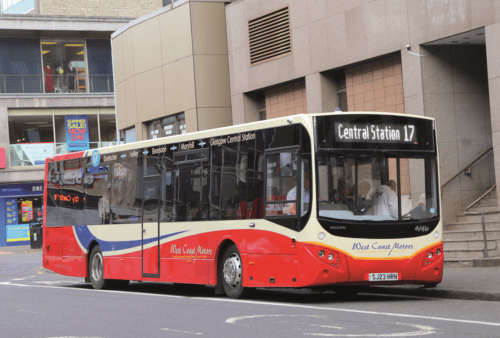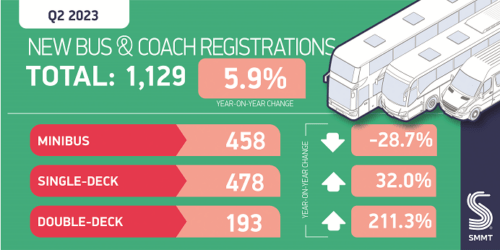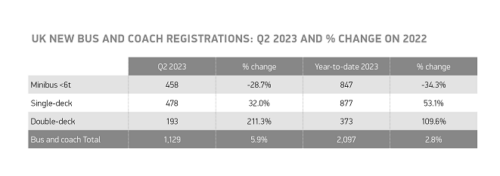
The UK new bus, coach and minibus market was up 5.9% in the second quarter of 2023, with 1,129 registered. The growth was driven by a surge in demand for both double- and single-deckers, up 211.3% and 32.0% respectively, while demand for minibuses fell by 28.7%, the latest figures from the Society of Motor Manufacturers and Traders (SMMT) show. Registrations remain some 21.2% below those in the same period in 2019, however, highlighting the scale of the challenge to get the UK’s bus, coach and minibus services back on the road to recovery.
The SMMT’s figures showed strong growth in the deliveries of double-deckers, up by 211.3% to 193. The number of new single-deckers rose by 32.0% to 478. Conversely, registrations of minibuses fell for the fifth quarter in a row, by 28.7% to 458, as supply disruptions hampered the sector despite strong order books. In the year to date, the overall market has risen by 2.8% to 2,097 – the best first-half performance since the pandemic began, albeit still 20.7% below 2019 levels.
Although passenger numbers have increased following the pandemic and short-term measures such as extending the Bus Fare Cap Grant will help to maintain that trend, the SMMT says a long-term strategy is still needed to boost operator confidence to invest in fleet renewal, particularly with electric and hydrogen models given the sector’s importance to UK decarbonisation; the Zero Emission Bus Regional Area (ZEBRA) fund has provided grants to 17 regions for the new vehicles, but a further 48 regions are yet to access the fund.
Mike Hawes, SMMT Chief Executive, said: “A rise in bus and coach fleet renewal driven by demand for single- and double-deckers indicates that the sector is stabilising – but operators continue to face highly challenging conditions, hampering sustained growth. The industry needs a long-term government strategy to deliver growth and decarbonisation, boosting uptake and underpinned by a more streamlined ZEBRA funding process. With the right support, this critical sector can continue to deliver affordable, accessible and sustainable mass mobility across the UK, while driving improvements to air quality in our towns and cities.”



